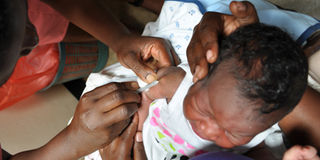Prime
Immunisation: Your child needs a full package

A nurse immunises a baby during a routine exercise at Mulago National Referral Hospital. Immunising children against the major childhood illnesses can save life as the children’s bodies build resistance against common infections.
PHOTO by Rachel Mabala
What you need to know:
Routine immunisation of children aims at preventing diseases such as measles, polio, whooping cough and diphtheria.
However, many parents are not aware that this package should include ensuring that children are dewormed and given Vitamin A supplements.
Patricia Kyansimire, a 27-year-old mother of two, is knowledgeable when it comes to issues of immunisation. Despite her busy work schedule, Kyansimire says she ensured that her children, five-year-old Cathy and two-year-old Timothy did not miss any of their immunisation appointments at the hospital.
And the record on their cards is evidence of this.
The cards show the children have been immunised against the common childhood illnesses that kill majority of children, including polio, tuberculosis, diphtheria, tetanus, whooping cough, measles, hepatitis B and haemophilus influenza.
The vaccines are usually given at birth, six, 10 and 14 weeks, and when a baby is nine months old.
However, the cards of Kyansimire’s children are blank on the section for Vitamin A supplements and de-worming.
And just like Kyansimire, many parents pay less attention to ensuring that their children receive Vitamin A supplements or deworming tablets, as part of a whole immunisation package.
“I thought my children had got all the important antigens. Besides, I do not think a child can die from not taking Vitamin A supplement or not being de-wormed,” says Kyansimire when asked about why her children have not received Vitamin A supplements.
Why Vitamin A is crucial
According to the World Health Organisation (WHO) and the Ministry of Health, Vitamin A supplements should be administered to a child at six months, and repeated every six months, until the child is five years. The same plan should be undertaken for de-worming when the child is six months until adulthood.
Dr Robert Mayanja, the manager in charge of the Uganda National Expanded Programme on Immunisation (Unepi), says parents should ensure all children receive Vitamin A supplements and get dewormed, alongside being immunised against the common killer childhood diseases.
Dr Mayanja says infants and children need more Vitamin A supplements to help fight other infections that they may be prone to.
The Ministry of Health says this is also one way through which child and infant deaths will be reduced.
According to WHO, Vitamin A deficiency is a major public health problem, affecting about 190 million pre-school age children, mostly in Africa and Southeast Asia.
Uganda is one of the countries in Africa where Vitamin A deficiency cases are also still high, with 28 and 23 per cent of children and women respectively said to be deficient in the mineral.
When a person is deficient in Vitamin A, their immunity becomes impaired, while their risk for developing eye damage and blindness is also high.
Annually, about 500,000 pre-school children go blind in Africa because of iron deficiency, and two-thirds will die within a few months of becoming blind.
“Infants and children need more Vitamin A requirements to promote rapid growth and to help combat infections. Inadequate intakes of Vitamin A at this age could lead to vitamin A deficiency, which, when severe, may cause visual impairment (night blindness) or increase the risk of illness and deaths from childhood infections such as measles and diarrhoea,” Dr Mayanja explains.
The country coordinator for vaccines and immunisation at WHO, Dr Andrew Bakainaga says deworming should be made part of the package to eliminate childhood illnesses, because it helps to kill parasitic worms that rob the infected child of nutrition, which may affect their physical growth and cognitive development.
The worms, however, do not only affect children. Women of childbearing age may also be affected as their risk for anaemia, abdominal pain and general body weakness also increases.
Children who suffer from intestinal worms may eventually suffer from conditions such as malnutrition, stomach ache, vomiting and body weakness because of the parasitic nature of the worms.
In order to kill the parasites, paediatricians recommend that young children be de-wormed every six months.
“Ideally a child should get dewormed six months after birth, since this is when they tend to touch various things and put their hands in their mouth. If what they touch is contaminated, it can cause the worms or their eggs to enter the bodies and grow in their stomach,” says Victoria Nabuule, the nursing officer in charge of immunisation at Mulago National Referral Hospital.
Nabuule says parents should ensure to deworm their children, even if they do not show signs of illnesses.
The most common symptoms of intestinal worms include itching of the area around the anus, decrease in appetite and grinding of the teeth. In extreme cases, children may have worms coming out of their anus.
In Uganda, Vitamin A deficiency and deworming challenges are being addressed through initiatives such as the child health days, often held in the month of October.
During these days, health centres are mobilised to distribute Vitamin A and deworming tablets to all children under the age of five.
Kyansimire hopes to use this opportunity to take her two children for the deworming and Vitamin A supplement distribution.
During the child health days, all public health facilities are required to offer special packages for children and their mothers. Apart from vaccinating children against the common childhood illnesses and giving them Vitamin A and deworming tablets, mothers are also provided with health education, nutrition, elimination of mother-to-child transmission of HIV/Aids services, HIV screening, family planning, antenatal care and cervical cancer screening.
“The idea is to give a second chance to children who could have missed immunisation in the routine service delivery system,” says Dr Mayanja, adding that the package should cater for both babies and mothers in a single visit because it is easy for mothers to come at once and get different services.
common vaccines used for childhood diseases
Oral Polio Vaccine (OPV)
Oral polio vaccine is given within the first two weeks of a child’s birth, and at six, 10 and 14 weeks respectively.
Polio is an infectious disease caused by a virus that lives in the throat and intestinal tract. It can spread from person-to-person, it can be contracted through the stool of an infected person, and may also be spread through oral or nasal secretions.
DPT
DPT vaccine helps children younger than seven to develop immunity to three deadly diseases caused by bacteria including diphtheria, tetanus, and whooping cough (pertussis). Diphtheria is a respiratory disease that can cause breathing problems, paralysis, heart failure, and death. It is highly contagious and is spread through coughing and sneezing.
BCG
Bacillus Calmette–Guerin (BCG) should be administered within the first 15 days of a child’s birth. It is crucial in offering protection against childhood tuberculosis, a common disease today.
Whooping cough vaccine
Whooping cough is a highly contagious disease that causes coughing spasms that are severe so that it makes it difficult for infants to eat, drink, or even breathe. It can lead to pneumonia, seizures, brain damage or death.
Measles
Measles vaccine is usually administered as a combination, meaning it provides protection against three viral diseases including measles, mumps and rubella. The vaccine is usually given at nine months.
Pneumonia
The pneumococcal conjugate vaccine is used for the prevention of pneumonia in children. In Uganda, most deaths from pneumonia occur among children below the age of five. The vaccine is usually administered to children when they reach the age of five.
Uganda’s immunisation coverage
According to the Ministry of Health, immunisation coverage has been improving in the country, with the number going from 52 to a current 98 per cent, largely attributed to aggressive campaigns and increased awareness among the public. For instance, coverage for diphtheria stood at 97 per cent by December 2013, compared to only 78 per cent in 2012.
At least 93 out of 112 districts attained coverage of more than 80 per cent for diphtheria vaccine. Currently, the immunisation programme targets 10 killer diseases. These include polio, tetanus, whooping cough, tuberculosis, diphtheria, measles, pneumonia, hepatitis B, haemophilus influenza and cervical cancer.
“Despite improvement in immunisation coverage in 2013, Uganda is still considered to be one of the high risk countries in the Horn of Africa that can get a polio outbreak due to the influx of refugees and porous borders,” says Dr Ellioda Tumwesigye, the state minister for health.
Door-to-door campaign
Because of this risk, Dr Tumwesigye says the ministry will in December conduct a house-to-house national polio campaign across the country.
The campaign will target all children below the age of five. Although Uganda last reported a case of polio in 2010, Tumwesigye says the country will next year introduce injectable polio as part of the campaign to completely eliminate the disease by 2018. The new injectable vaccine called Inactivated Polio Vaccine (IPV), consists of inactivated or killed poliovirus strains
“Parents are urged to ensure every child is taken for immunisation at least five times before their first birth day,” explains Dr Tumwesigye.
HPV vaccine
Besides immunisation against childhood diseases, Dr Tumwesigye says the Human Papilloma Virus Vaccine (HPV), that aims to protect girls against cancer of the cervix will be introduced as part of the national routine immunisation programme. The vaccine will be administered to all girls aged 10 years. This follows a pilot programme that has been running in 14 selected districts across the country.
He says the ministry also intends to improve routine immunisation by increasing storage space for the vaccines.
“With funding from Global Alliance for Vaccine Initiative (GAVI), the government will procure over 800 fridges for districts and health center IIIs,” says Dr Tumwesigye.




